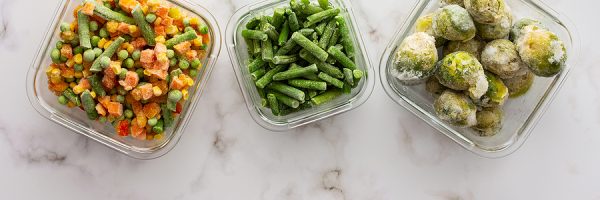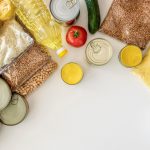By David Blyweiss, M.D., Advanced Natural Wellness
With the arrival of winter weather, fresh fruits and vegetables are going to be shipped from further and further away. In fact, according to the Fruit Growers Supply Company, the average fruit or vegetable you purchase at a local US grocery store travels at least 1,500 miles over the course of several days.
Once at the store, the produce could be on display for two or three days before you buy it. Then, when you bring your purchases home, they might sit around on the counter or in the refrigerator for another week or so.
So there can be a significant period of time between when the produce is harvested and when it ends up on your dinner plate. And during the time, those fruits and veggies are going to lose nutritional value.
To make matters even worse, fresh produce is typically picked before it’s ripe. So it never even has the opportunity to reach peak nutritional value in the first place.
While that may sound like bleak news, there’s a simple solution to this problem that may surprise you.
Frozen Fruits and Veggies Can be More Nutritious than Fresh
Most people assume that fresh produce has a higher nutritional content than frozen. But in most cases, that’s simply not true.
When ripe produce is flash frozen right after harvest, it is at peak nutritional level. And the vitamins, antioxidants and phytochemicals in them don’t degrade over time the way they do with fresh produce. They are “locked in” during the blanching and freezing process.
This is a topic that has actually been studied. Most recently, research out of the University of Georgia tested the nutrient value of eight foods in both their fresh and frozen states. Blueberries, strawberries, broccoli, cauliflower, corn, green beans, spinach and green peas were all included.
What the study showed was that, in most situations, the frozen produce retained much more nutritional value than its 5-day fresh-stored counterpart. In other words, fresh produce stored in the refrigerated lost more nutrients over time.
The study concluded that “…frozen produce outperformed ‘fresh-stored’ more frequently than ‘fresh-stored’ outperformed frozen.”
And let’s talk about blueberries! These are one of my favorite foods, and I notice that when they are frozen, they often taste a little bit sweeter. So I love the fact that frozen blueberries actually have a higher anthocyanin content – the antioxidant that gives blueberries their super powers – than fresh.
Ultimately, unless you pick something from a garden in your yard or purchase it from a farmer’s market where it was picked yesterday for sale today, you just can’t beat the peak nutrition found in frozen produce.
Choosing the Best Quality Frozen Produce
Frozen fruits and veggies are just as healthy as fresh, and often even more so. But for even greater health and nutritional value, I recommend buying organic whenever possible.
Compared to commercial fruits and vegetables, organic produce contains up to 69% more flavanones, 51% more anthocyanins and 28% more stilbenes. Plus, they don’t have lingering herbicides and pesticides the way commercial produce does.
But you do need to read the labels on those frozen foods to make sure they don’t have any added salt or sugar. And you want to avoid frozen vegetables that are pre-seasoned or packaged in sauce. They will be full of sodium and preservatives.
One of the big bonuses of buying frozen is that all the hard work has been done for you. Everything has already been washed, peeled, sliced and diced.
And you don’t have to worry about spoilage. A head of broccoli, a bag of fresh spinach or a box of strawberries won’t last long in the fridge. But when you buy them frozen you can store them for about a year before the quality starts to deteriorate. So you have plenty of time to use them without worrying that they’ll go bad.
You can cook frozen veggies much the same way you cook those that are fresh. They can be sautéed, steamed, broiled and even grilled. And it’s very convenient to be able to pull just a handful of spinach, peas, carrots or other vegetable from a bag to toss into your soups, sautés and casseroles.
SOURCES:
Mazzeo T, Paciulli M, Chiavaro E, Visconti A, Fogliano V, Ganino T, Pellegrini N. Impact of the industrial freezing process on selected vegetables -Part II. Colour and bioactive compounds. Food Res Int. 2015 Sep;75:89-97.
Li L, Pegg RB, Eitenmiller RR, Chun J-Y, Kerrihard AL. Selected nutrient analyses of fresh, fresh-stored, and frozen fruits and vegetables. J Food Compost Anal. 2017;59:8-17.
Lohachoompol V, Srzednicki G, Craske J. The Change of Total Anthocyanins in Blueberries and Their Antioxidant Effect After Drying and Freezing. J Biomed Biotechnol. 2004;2004(5):248-252. Barański M, Srednicka-Tober D, Volakakis N, Seal C, Sanderson R, Stewart GB, Benbrook C, Biavati B, Markellou E, Giotis C, Gromadzka-Ostrowska J, Rembiałkowska E, Skwarło-Sońta K, Tahvonen R, Janovská D, Niggli U, Nicot P, Leifert C. Higher antioxidant and lower cadmium concentrations and lower incidence of pesticide residues in organically grown crops: a systematic literature review and meta-analyses. Br J Nutr. 2014 Sep 14;112(5):794-811.



